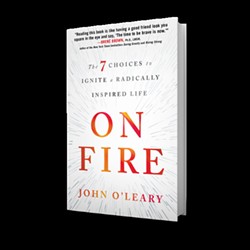
Photo Courtesy of the O'Leary family
John O'Leary uses his story of overwhelming odds to wake people up to the possibility of their own lives.
In January 1987, nine-year-old John O’Leary caught fire. He was in his garage, playing with matches and gasoline, when he sparked an explosion. Flames leapt onto his body, melting off his clothes and his skin, as he ran through the house screaming for help. His older brother Jim, then 17, ran up from the basement, extinguishing the flames with a rug, ultimately saving the little boy's life.
O’Leary suffered third-degree burns on 100 percent of his body and was given the grim prognosis of a one-percent chance at survival. Yet somehow, he beat the odds. Today he's a happily married, 38-year-old father of four and a professional speaker.
But as he writes in his first book, On Fire: The 7 Choices to Ignite a Radically Inspired Life, which was released by Simon & Schuster on March 15, this story isn’t about him. It’s about you. O'Leary has focused his story on the many St. Louisans—and some local celebrities—who helped him through his five months in the hospital, his many surgeries, including an amputation of his fingers, and the 29 years that followed the fire.
“This is not an ego trip, it’s not about someone else overcoming; it is their journey,” O'Leary says of his readers. “It is their invitation to wake up to the great possibility of their lives.”
The book is already striking a chord. It's risen as high as No. 4 on Amazon and is a No. 1 new release in the Happiness and Self-Help category, a result O’Leary calls “stunning.”
Along with O’Leary’s own experience, the book recounts the many St. Louisans who changed his life through simple actions that would have extraordinary consequences. There’s the janitor who taught him how to walk again; Gino Cavallini, formerly of the St. Louis Blues, who became a fixture at the hospital as O’Leary recovered; and O’Leary’s own mother, who was brave enough to tell him that surviving wasn’t a given—living was a choice he would have to make.
And then there's the late Cardinals broadcaster Jack Buck, who O'Leary credits for making him who he is today. On the second day in the hospital, O’Leary lay strapped down to the bed, his eyes swollen shut, a tracheotomy in his throat, rendering him unable to speak—all he could do was listen.
Then something extraordinary happened.
“Now the broadcaster for the Cardinals, the voice I grew up listening to and loving, walks in to my room,” he recalls, “and encourages me with the words, ‘Kid, wake up! You are going to live. You are going to survive, keep fighting. When you get out of here we’re going to celebrate with John O’Leary Day at the ballpark.'” As O’Leary tells it, he lowers his voice, adding some Jack Buck grit in imitation.
For most young boys growing up in St. Louis—heck, for anyone living in this city – one visit from Buck would have been enough. It was for O’Leary. But the story didn’t end there. As Buck was leaving that day, he was told the boy was going to die, with just a one percent chance at survival.
The story moved Buck. So he came back.
“The following day, I’m lying in the hospital bed, dying and my door opens up: I hear footsteps, I hear a chair, and I hear Jack Buck’s voice say, ‘Hey, kid, I’m back. Wake up. You are going to live. You are going to survive, keep fighting,’” O’Leary recalls.
For the next five months, the visits from Buck continued. When Buck's duties with the Cardinals took him away, he would send someone else in his place. “That man made a profound difference during the five months that I was in the hospital,” O'Leary says. And “he continues to serve me afterwards,” he adds.
In July of 1987, Buck lived up to his promise: O’Leary celebrated ‘John O’Leary Day’ at the old Busch Memorial Stadium. By that point, O’Leary was velcroed into a wheel chair, his fingers were gone and his skin was just starting to grow back.
“The following day in my mailbox is a baseball from Jack Buck, signed by Ozzie Smith, and a note from Jack that reads: ‘Kid, if you want a second baseball, all you have to do is sign a thank you letter to the man who sent the first one,’” O’Leary remembers. “The guy knew I could not write, but I think he also knew the power of inspiration and the power of connectivity.”
Next: The baseballs keep coming.






